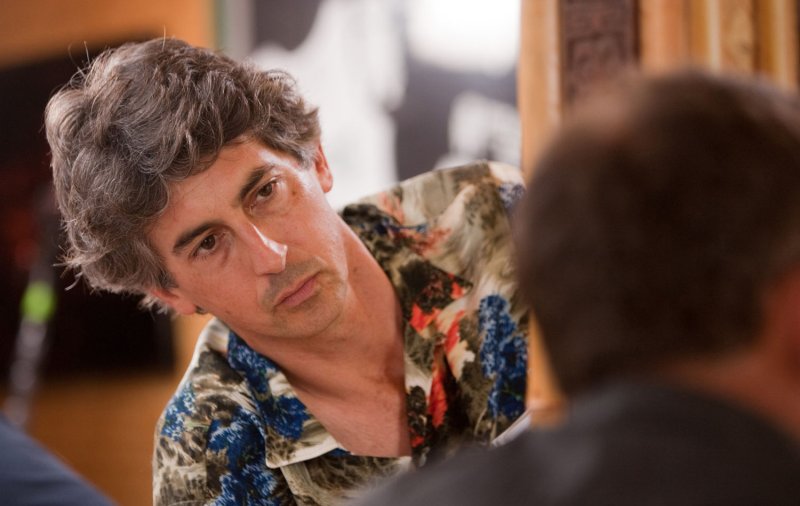1 of 3 | Alexander Payne, pictured, was nominated for best director for "The Descendants" for the 84th annual Academy Awards in Beverly Hills, California on January 24, 2012. The 84th annual Academy Awards will be held in Los Angeles on Sunday, February 26, 2012. UPI/ Jaap Buitendijk/HO.. |
License Photo
NEW YORK, Feb. 20 (UPI) -- Hollywood writer-director-producer Alexander Payne says he is pleased people recognize the tone of his Best Picture Oscar contender "The Descendants" is reflective of real life.
The Hawaii-set drama tells the story of Matt King, a lawyer whose wife falls into a coma following a boating accident, and how he reconnects with his two daughters through their shared grief and anger. When doctors inform Matt Elizabeth isn't going to recover, Matt encourages her loved ones, including her parents and even the man she had been having an affair with, to say their goodbyes as she is removed from life support. A subplot of the movie finds Matt's extended family pressuring him to sell their ancestral land to developers because he is the trustee and they all stand to get rich off the deal.
George Clooney earned an Oscar nomination for his portrayal of Matt while Patricia Hastie plays his dying wife and Shailene Woodley and Amara Miller play their daughters. Beau Bridges plays Matt's cousin, Robert Forster plays Elizabeth's father and Matthew Lillard plays the married man with whom Elizabeth had been cheating on Matt.
Asked how he kept the film from becoming too heavy or preachy, despite its serious subject matter, Payne told United Press International in New York recently: "The style is the man himself.
"Questions of tone, questions of style always speak to just what occurs to the writer or the musician or, in this case, the director -- and I don't work alone, I have many, many collaborators, but I make the final decisions -- of what he or she would like to see. That tone is just what I think comprises a good movie," he explained.
Acknowledging how the film features comedy and pathos, sometimes in close proximity, Payne said he thinks that is indicative of how life is.
"I don't think that's me. I think that's life," he reasoned. "Life has a thick tone, like that of constant hairpin turns from laughter to tears and if I'm able to achieve that somewhat in my films, then I'm happy about that."
Payne, who is also nominated for Best Director and Best Adapted Screenplay at this year's Oscars, said the creative process of making a film is more important to him than how the picture is received after it is completed.
"My life is not the resulting film," he confided. "What affects me is the time I have making it. The fun I have, who I get to meet, the camaraderie of that crew, getting to work artistically with those actors and those creative collaborators behind the camera. But I am complimented if each individual film presents a world of its own."
Payne, whose film credits include "Citizen Ruth," "Election" and "About Schmidt," said he tends not to overshoot footage, but does film a little more than he needs so he can shape the movie in the editing room.
"So, I have wiggle room," noted the filmmaker whose latest effort is also up for the Editing Oscar. "Directing is only harvesting things to edit. ... We spent months and months and months calibrating that tone down to the frame. Exactly where does the music begin? Exactly where does it end? All of those fragile elements ... I think film is comprised of fragile things, not broad strokes. Everything in a film is fragile and very unique and particular."
So, how did Payne go about assembling his stellar ensemble for "The Descendants," his first feature film since 2004's wildly popular, wine-country buddy flick "Sideways?"
"Everyone in the movie auditioned except for Clooney, that was an offer. And the two old lions -- Bridges and Forster -- I met with them, they didn't need to audition. But they read the screenplay and then we talked and then I was able to consider them," Payne said. "Shailene auditioned for me here in New York in December '09 and just knocked my socks off. There was no also-ran. She was the only one out of hundreds of girls I considered even remotely right for the part. My model had been a 17-year-old Debra Winger, who would have been really perfect casting for that part, that fire and that vulnerability."
The filmmaker admitted he was particularly excited to work with film and TV icons Forster and Bridges.
"What an honor it was to direct those cats," he recalled.
Pressed to describe what appealed to him about adapting Kaui Hart Hemmings' novel for the big screen, Payne replied: "I, in general, am attracted to good stories about people and a story about people I would believe could really happen in real life and free of movie contrivance and then that it would happen in a place and among a class of people that make it even more interesting, someplace I'd like to go.
"I'm so grateful to Kaui Hart Hemmings, the writer of the book," he added. "I could have never thought of a story like this in a million years."
"The Descendants," which won the Golden Globe Award for Best Drama, is in theaters now.















